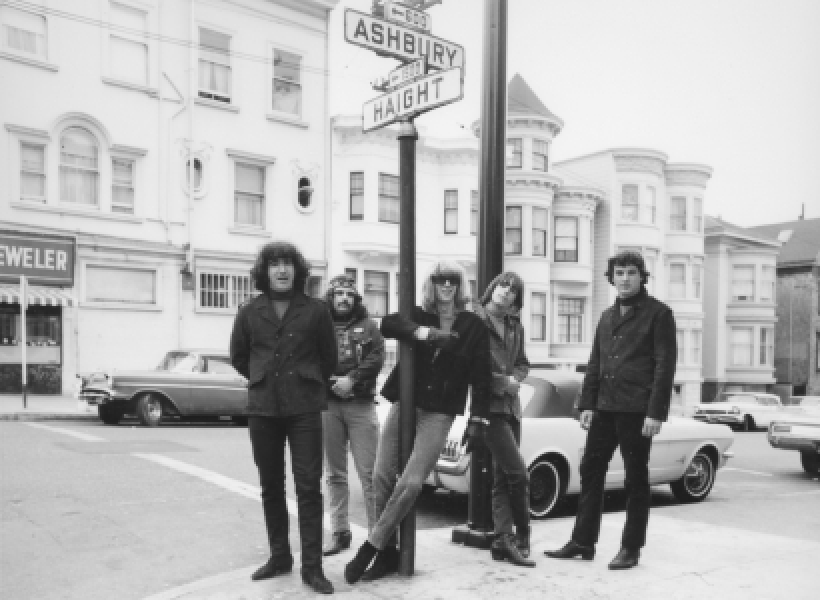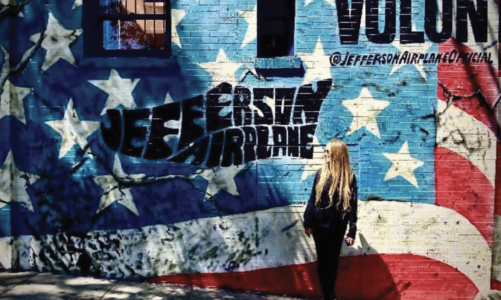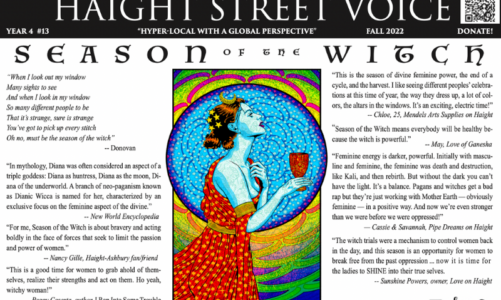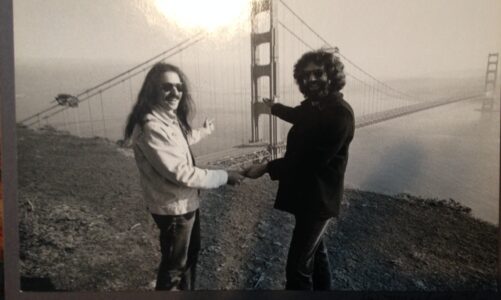Comes a time when the blind man takes your hand, says “Don’t you see?”
Gotta make it somehow on the dreams you still believe
Don’t give it up, you got an empty cup that only love can fill, only love can fill
Been walking all morning, went walking all night
I can’t see much difference between the dark and light
And I feel the wind, and I taste the rain
Never in my mind to cause so much pain
— Comes a Time, (Garcia, Hunter)
Grateful Dead
Home. Isn’t that where the heart is supposed to be? Well, my heart has left the building. Had to put the love of my life, my sweet Cali, my beautiful 20 year old cat “up” just a few days back and my heart and home are asunder.
Time heals all wounds, right? All you have to do is close one door and open another — but it sure is hell in the hallway. Seems I’m stuck in the hallway, or at least I was. But after a bit of time and a bazillion tears, there was a light peeking under the door, a light reminding me to remember where I live, where I’ve lived for nearly 40 years now, where I’ve been coming to since I was a weary 19-year-old whose mother split the planet. Who lived at 612 Ashbury in 1982 just after mom flew on. The Haight Ashbury helped heal my soul, gave me the space to retrieve my heart, to dive into school and journalism, to take my mind off the harsh realities I was facing.
Today, as I walk around the neighborhood, there’s a familiar healing in the air. I can sense my sweet Cali flying around, free as a bird, and my heart shines a bit brighter. The Haight Ashbury is my home, and my heart is indeed here. And I am ever grateful.
Herb Greene, deep gratitude to you for this photo, for capturing this magical moment in time with the Grateful Dead under the sign that waves the freak flag of freedom — be it blissful, sad, crazy, messed up, always beautiful. I am where I belong. I am HOME.
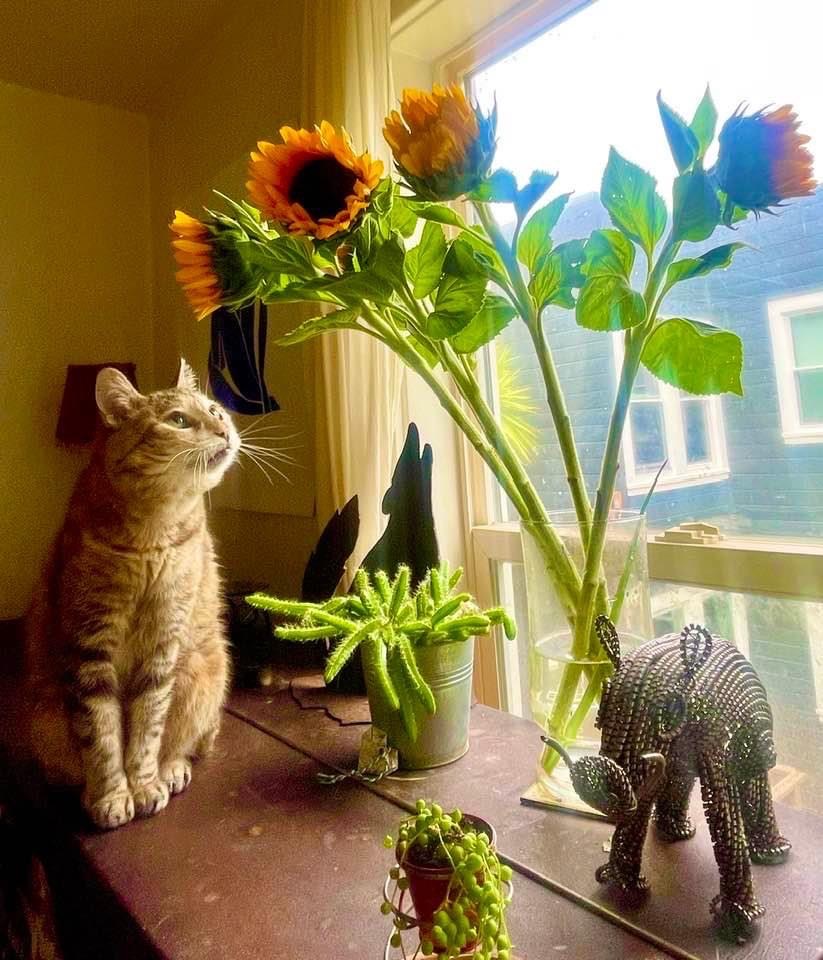
FULL TRANSCRIPT
June 14, 2023
Dr. Dave’s house
HSV: We’re here with Dr. Dave’s and we’re talking about grief and then I met Keith Loring and Dr. Dave is here to talk about how they work.
DD: Hi Linda. I’m very glad you got to meet Keith. We’re very involved in psychedelic therapy and the research and studies and how it works on the brain. In terms of a neurobiological point of view, trauma is an insult to the brain. It can be the explosion of a bomb, it can be the loss of a loved one. The brain processes it and if you thought about the trauma all time, you couldn’t function. So the natural function of the brain is to bury it into the sub cortical, or subconscious. That’s the grieving process. In other words, trauma, grief processing. Grieving is a process to help resolve it and get the trauma memories back out of the different parts of the brain so it doesn’t produce the prolonged grief response which is the most disabling, where you have grief but you can’t process it and you are depressed for a very long period of time.
In the model that we use, there is this interaction between the intake, in this case me, and Keith, which is the facilitator. And then the model that we use with Keith being the facilitator is let the grief out, experience the grief, cry, don’t try to bury it. Share it with trusted friends, we call this the Circle of Trust. In other words if you have grief, let’s say you have to work or you have to have people that don’t understand trauma and grief, then you tend to bury it. So you have to have a Circle of Trust.
HSV: How about make an entire magazine about it? Putting it into the magazine.
DD: Do objective activities to help others. In other words, Linda is talking about using Haight Street Voice and what she’s doing is using her own grief to help other people who are going through grief. If you’re a pet owner, like we are, like Keith is, and you lose a pet, some people don’t recognize how devastating that is, how much grief that produces. And they’ll say things like, “Oh it was just a dog …” Well no. It’s a loving, close family member of yours that’s been with you every second of the day.
Also, this is an area of the brain called the amygdala that processes incoming stimuli. Then it fits into the area of the brain called the “hippocampus”, which is the memory circuit. And then out comes memories. And talking with Linda it triggered memories of when her mother died early
HSV: And my horse, and my grandma.
DD: And your horse, and your grandma. And that happens to me too. The trauma could be the same for everybody, but the grief response is different in part because the grief response triggers memories of the past. And those are the types of things that can be integrated. The way that psychedelic therapy participates in this is that [phone rings]
PART 2:
HSV: It’s so interesting that Keith happened to be here, and then Wilson was of course licking me and all over me knowing I was crying. Pet therapy. And then your daughter walking in, I’ve never met her — what’s her name?
DD: Suzanne.
HSV: Her walking in and her talking about her 18 year old daughter graduating and how amazing that is, and my relationship with my father and he passed away. Seeing all that here was so beautiful, seeing that full circle of life, of Dad’s gone but here I am. [crying] Grief’s just part of the damn deal, you know?
DD: Yes, but out of grief comes insights and awareness.
HSV: And life! You have to close that, and another thing opens. To accept death is to accept life at the same time. I just wanted to say that.
DD: That’s also what you just talked about, Linda. That’s processing.
HSV: [sniffling] Yeah.
DD: You’ve just started to process, the Circle of Trust.
I’m gonna have another daughter bring me some cuz of my knee injury and Millicent being away, and that’s building the social network. It’s really hard to not deal with these issues without a social network. When you lose a pet, you lose an essential part of your social network.
HSV: She was my rock. She was everything. Which is the same way I was when my mom died, my horse died and my grandma died. I was like, “Oh, I’m fine. I can handle it.” And I just closed down, powered forward. And putting on a happy face for the public when I’m working in retail or working on the magazine. “Oh yeah! Hi! I’ll be the rock!” But it’s like, you know what? I can’t do that this edition cuz my cat’s fucking gone. Pardon my French.
So I said you know what? I’ll make the magazine about grief and processing. It’s not the depression edition, it’s let’s go through the reality of what I’m going through. If people don’t like this edition, I don’t fucking care.
DD: Think about it as a way of helping. And why psychedelic therapy is utilized for trauma because it opens up that area of the brain. That’s kind of what a bad trip is, suddenly all this stuff comes out. You do it for fun but then memories of your mother dying, your cat dying, all that stuff comes up. So what you got a flavor of is psychedelics as medicine to deal with trauma and grief and PTSD. This is exactly why it works for PTSD.
HSV: Sitting with it stoned cold sober is the hardest thing to do, and I did it. I’ve been sitting at my house, sitting with it and writing about it. And it’s been lonely cuz she’s not there but I have so many people calling me and loving me and all of that. It’s okay to go into the grief. And go into your heart. That’s what my Cherokee medicine man told me: Just go into your heart. It hurts and go in there all the way until you think you can’t handle it any more and all of a sudden something will shift where it’s beautiful.
DD: Yeah.
HSV: And thought that was incredible. So that’s that.
DD: You’re probing into the deepest regions of your brain and coming out with insights for living. And then you’re using your magazine to help people share who are going through that. There’s a lot of grieving. Particularly at this stage of my life, we have so many friends of ours who have lost their spouses.
HSV: The whole world is grieving right now. It’s a freaking weird time in the world. There’s a lot of people in pain. And everyone’s trying to keep it down and keep a grip and be the strong one and suck it up and drive on. I think it’s okay to grieve and really let it be there. So thank you for letting me come to your house and cry my eyes out. [laughter]
So then what? As far as psychedelic-induced psychotherapy, there’s a part of me that says oh I should do that — not just because of my cat. I’ve been thinking about it as kind of a journalism foray into what the experience is like. I was thinking about doing it with Keith and I still might. But at this juncture I’m not sure that’s what I really want or where I want to go. I kind of want to be more present with it rather than try to go deeper.
DD: Let the grief out. [daughter comes in]
Daughter: Hi Dad!
DD: Hi Julia! This is Linda of Haight Street Voice.
Julia: So I got you really green bananas, apples, and soup.
PART 3:
HSV: Well I’ve gone through it with my mother, my horse, my grandma in my teens. It was all these things at once. I’ve done vision quests and sweat lodges for a year living in New Mexico. It’s always coming back to the heart. That’s really all it is. It’s always right here. The answer is here. And grief — you have to go through the deepest part of your heart to get to whatever it is that’s coming next. And it’s so easy to get stuck in the death area, the grief area.
[Hi to Wilson, his sweet little dog] And that’s why animals are everything in the universe, yes.
Keith Loring: We walked the Haight.
HSV: [To Wilson]: Did you see all the doggies down there?
DD: Ask Keith some questions.
HSV: Let me ask you this, Keith, and you Dr. Dave. I used to have a picture of my cat on there since Friday when she passed, and every time I looked at it I was crying. And I decided you know she’s been released now so I’m going to have a hummingbird now, which is about joy, and flying between this realm and the next, the gatekeepers.
But then I felt bad like I was letting the cat go, all those weird emotions. I don’t know if that resonates for you or triggers anything or any sort of wisdom you have around that?
KL: No, it just sounds like different parts of you that are navigating this new territory.
HSV: Old-new territory. It’s like taking off a scab or opening up a scar.
DD: Yes, you’re navigating old territory in a new way. And it’s really tough to do, to navigate old territory in a new way. That’s what the process is.
HSV: [about psychedelic therapy] Keith you said it’s about reconnecting with the essence of our true selves.
KL: I think that’s the spiritual path. I think we were born fully authentic. We knew exactly what we needed and we had a biological was in which to ask for that. When you’re an infant, if you’re hungry, you cry, or you’re in pain, you cry. We’re utterly dependent on the environment around us. So we show up fully authentic and then the environment around us — at least in this culture — doesn’t show up the way we need it to naturally unfold into a blissful adult human being. We’re all meant to be in bliss and happy.
Grief is part of bliss. We lose things and we grieve it and we continue on. But in this world we live in, we’re not able to do that, we’re not allowed to do that early on. And so we take that to mean that’s how the world is. We disconnect from our authentic self. So the work once we become adult is we can continue to be miserable and disconnected or we can do the work to reconnect, to become fully authentic, and to live through essence rather than live through our wounded parts. But we live through our wounded parts and we continue to live through our wounded parts for the rest of our lives or we heal the wounds.
HSV: Right. But don’t they continue to rear their heads? Aren’t the wounds always there?
KL: Wounds stay there if we continue to fester them. Wounds heal, but we think that they can’t. We live in a culture that doesn’t believe that they can. What we do in this culture is we tend to the symptoms not the wounds. We tend to the pain, to the craving, to the this, the that. The pain in our body is our body telling us that there’s something to look at. It’s not telling us to get rid of the pain, it’s telling us to look at something.
The craving we have when we’re in addiction — the craving is not the problem. It’s asking us to take a look at why we’re craving. I see addiction as a process. It’s not a fixed thing that somebody’s stuck with for the rest of their life, except that that is currently kind of the way we see it and so everybody believes that, most people believe that.
The 12 steps is a beautiful approach to resolving most of the issues around addiction except that it sees a lot of our behaviors as character defects. No, these are coping mechanisms that got us through earlier life and they’re not working so well now. But it doesn’t help to vilify them, it doesn’t help to try and purge them because we’re trying to get rid of parts of ourselves.
HSV: Right! I never liked the thing about it, that line about “I’m powerless” or something like that?
KL: There’s a lot that we don’t know and so to that extent we are — we become powerless because we give away our power.
HSV: Right.
KL: We give our power away to a drug, we give away our power to whatever. We just don’t understand that process very well. And by the way, back to this disconnect from the authentic self: What is recovery? Everyone talks about “oh I’m in recovery” or “I’m recovering”. Well, what are you recovering? Are you recovering from something or are you recovering something? And I see it as recovering something: recovering our authentic self.
HSV: Wow. I love that.
KL: I’m not recovering from crystal use, for instance, I’m recovering my authentic self.
HSV: How did you get into this whole thing with Dr. Dave?
KL: Well all the stuff I went to school for is not what I’m doing right now.
HSV: [laughter] I love it!
KL: Which is to say formal education kind of squeezes our power. It doesn’t have a lot of room for curiosity, and it’s curiosity that really is what drives us. That’s an essential healing quality is to be curious really, truly. Curiosity is joy in the truth.
HSV: That’s funny cuz I’ve always said on my epitaph I want it to say “Infinitely curious and still looking for more.” Because it was school and it was journalism and other peoples’ stories that got me out of all the pain that I was in. And moving to New York and becoming a journalist. Yeah, I was running away from but I was also running into and towards something that I knew I wanted to be since I was 5.
KL: Right. Well, what we learn is we can’t run away from our pain. We try to create new circumstances and go to new places but what we still continue doing is we’re trying to solve a problem we don’t fully understand by recreating the circumstances over and over again. And I don’t mean the specific stories. It’s the inner stories, the inner circumstance, those feelings. And it’s because those parts of us that are still hurting are driving us, they’re pulling us back to that pain. That pain is going to stay there until we find a way to work authentically through it and past it, and discharge it. Numbing the pain doesn’t get rid of it. It stays in the body. It stays in our being.
HSV: Yes. I love that piece about curiosity being the way — not out of but toward your authentic self.
KL: Well, it IS your authentic self. If you’re curious, if you’re in curiosity, you’re being authentic in that moment. We have moments of authenticity. So when I say we’re disconnected from it, it’s just that we’re not always fully in it.
Perhaps the most traumatized among us really rarely are able to be in authenticity. In fact, people with severe trauma, and I don’t think you or I qualify for that, but people with severe horrific trauma they develop parts whose job is to stay away. Say somebody was severely abused by a parent, they learn that any time that child starts acting authentic, that’s when they perpetrate on them. And so the child develops parts that are allergic to being authentic. So anytime somebody shows up who’s authentic or trying to work with them that way, those parts step up and say “NO, this isn’t going to work.”
HSV: Wow.
KL: So those are the parts they have to get to know first. Which we can with good therapy. And psychedelics may help if they don’t go into psychosis. If somebody goes into psychosis it’s not safe for them to be getting psychedelics.
HSV: Yes, I can see that. There’s no safe space, I can see that for sure.
KL: So anyhow, yeah, curiosity is a key, key aspect of human essential qualities. Healing is what our bodies will automatically do if allowed to do it, but the mind, our psyches, get in the way of that. The body has all the wisdom.
HSV: What is crying then? Why is that so therapeutic? I’m just riffing with you here. Like losing my cat — all the pain of my past came flooding back.
KL: I couldn’t tell you from a scientific standpoint, but it’s catharsis, it is allowing the experience that you couldn’t — that you haven’t allowed yourself. At the most healthy level, crying is grief, and grief is just the recognition that we’ve lost something that was important to us.
HSV: It’s the surrealness of the space for me. Walking into the house when she’s not there corralling me into the bathroom for a meeting. That space and that surreal WTF she’s not here. And that physical versus the spiritual and that weird space for me. It’s like that saying — I’m not even sure that I made it up but: “All you have to do is close one door and open another — but it sure is hell in the hallway.” I’m in the hallway right now and it sucks. Except that it’s beautiful too, Keith. It’s both.
KL: But does your happiness depend on whether the cat’s there or not?
HSV: No because I know she was released in a really beautiful way and she’s not in pain anymore, she’s fine. It’s me taking care of me now. She wants me to take care of me. That’s the way I feel about it. This empty space is now all the energy and love I was giving her needs to come back to me. For some reason that’s making me cry right now and I don’t know what that’s about. That’s the trick or that’s the answer, the key? Is to turn all of that back into my own heart. I mean still send her love. That space is what really freaks me out. What is that space? I’m not talking about it very well cuz I’m emotional but …
KL: That’s okay!
HSV: That space is the weird trippy place that I don’t know what to do with. Ahhhh!
KL: Well, so maybe that’s the space that needs resolution is that maybe there was a time much earlier in your life where you were in that space of not knowing what to do and there was no support.
HSV: That’s exactly what it is.
KL: Yeah, okay. Right, okay. So what do you say, what are you telling yourself when you’re in that space?
HSV: It’s all the abandonment stuff and my siblings were gone and I was home alone. My dad left, everybody left, and I’m there in the house I grew up in and nobody’s there. I mean it was really intense. And I wasn’t crying then. I was like “Oh yeah, I’m going to college … “ It was just soldier on.
KL: Right.
HSV: I’ve been through a little therapy over the years but not really. Medicine men and healing therapy and vision quests were really the answer for me cuz I’m part Cherokee and that has been facilitating.
KL: And I’m hearing there’s a part of you though that at that time may still hold some beliefs that may not be true.
HSV: Oh yeah. It’s abandonment stuff.
KL: Right. So those are the beliefs that … that’s the part that needs attention because it’s holding on to these extreme beliefs that there’s something wrong with you, right? Is that possible?
HSV: It’s very possible.
KL: Yeah. And I imagine there’s another part of you that at a deeper level you may have a sense that that’s not true. There’s nothing wrong with you.
HSV: Oh totally! I know I believe in myself and I had my father, an awesome father, architect, believed in me, believe in my magazine. Very supportive. And my family is very loving it was just that horrible few years of my life.
KL: Right. It sounds like, what I’m hearing you say is that there’s still a part of you that holds some limiting beliefs that made perfect sense at the time.
[Dr. Dave comes in]: Okay therapy session, Scott Weiner comes on at noon with Psychedelic Entheogen Academic Council online.
HSV: Are you kicking me out [laughter] Dr. Dave, any closing statements?
DD: I’m really happy you’re here to talk with Keith.
HSV: And you. It’s a magazine article about Psychedelic Center.
DD: Yes, for you to see how we work together. This is a classic example of how we work together.
HSV: And I’m the guinea pig! [laughter]
KL: We don’t say that we’re doing therapy sessions. That’s not something that we typically do.
DD: We talk about them.
KL: We talk about them at an intellectual level.
DD: I talk to you and we get the feedback. We talked about Cherokee Nation.
HSV: I’m part Cherokee.
DD: I’ve got some Cherokee in me and Keith, he knew that, and in some of the preparation he played choir. When you get a facilitator like Keith, he knows your cultural background.
KL: Sometimes! [laughter]
HSV: Thank you Keith.
KL: Sure.
HSV: Anything you want to say to the Haight Ashbury community, let alone any community throughout the world?
KL: Sure. Trust that we each have within us the capacity to move toward wholeness. This is a quote from Gabor Mate.
DD: That’s what Keith talks about a lot. I have Keith’s article here, let’s see if I can find it. [hands me paper] Keith is my psychedelic guru.
HSV: And so somebody reading this or listening to this, if they wanted to reach out to you would I send them your way? How would that work? If somebody says I really love what he read …
DD: This is his article. Trauma is a disconnection of permanent healing as a recommendation point.
KL: There you go. Alright, it’s 12 o’clock!
DD: What a session! What a treat! I normally only get Keith on Tuesdays! And now I get Keith on Wednesday — and Linda!
HSV: Thank you Dr. Dave! Anything you want to say to the Haight-Ashbury community right now in closing?
DD: There’s a model for dealing with grief and trauma and to understand that it’s part of the human condition.
HSV: Thank you both very much!
________
PEAC Meeting:
DD: Our webinar is going to be focused on psilocybin as a medicine. We’re going to be talking about psilocybin and substance disorders. And the exciting thing is that we’ve got 2 young addiction medicine fellows who are being trained in addiction medicine and psychedelic therapy.
I spent a lot of time talking to Jenny. I believe in the big picture of what everybody’s talking about but my focus is narrow. To detach psilocybin from a drug and as a psychedelic medicine. And this is one of the things that I am every concerned about when you talk about let’s get psilocybin legalized, and then legalize all other drugs. That’s like waving a red flag in front of bulls. That’s exactly what they say will happen. But they wouldn’t talk that way if they viewed psychedelics and psilocybin as medicines. You don’t say you’ll decriminalize an antidepressant and aggravate the drug problem. You look at it and say gee maybe that will help solve it. That keeps going back to this out of control drug problem in SF.
We’re going to be — my world is very focused, which is on the medical community and addiction medicine in the community. That is what the webinar thing is getting at, letting people tune in through the SF Med Society. And you have link to it. We’ve had this debate a lot in the past: Well, medicine wants to control. Medicine doesn’t want to control, medicine wants to use it as a tool. And how can you use it as a tool like Jen said, everything she does is underground. Like what she said on Bicycle Day, stop referring so many patients to her because they’re very concerned that the DEA will find out about it. It is no way to practice medicine. I don’t want people arrested, I don’t want them sent to jail — any of that. But that to me is a related issue to the issue that we’re focused on, is to get it looked on and rescheduled as a medicine. And that’s what this webinar is going to be talking about. We’ve got 2 sessions on it.
The webinar will come to the Roundtable. Our webinar is a complimentary to PEAC. We support PEAC, but the PEAC deals with much broader issues. And we hope that the Roundtable will summarize what is said at the webinar. We’d love to have Senator Weiner to speak but he’s so hard to get, it’s a miracle that you got him. I was hoping PEAC could summarize what he said at the 5pm Roundtable. We’ve been taking notes on this. I guess he said progress not perfection. I guess he meant political progress. I was a little disappointed that it wasn’t further along, but I can understand. He’s heroic to try and move it ahead.
I better understand the political opposition. We’re here in this bubble in San Francisco and think oh everybody supportive about it but then the real world clicks. My take on it is that patients are suffering because of that stigmatization.

